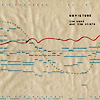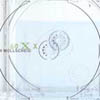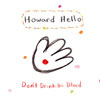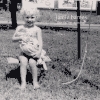 Three years after Dave Pearce released Mirroras Flying Saucer attack, he's now teamed up with Jessica Bailiff toform Clear Horizon. It sounds exactly as I expected a collaborationbetween those two, and I can't imagine anything better. There isn'tmuch indication as to which one of the two initiated the writing on anyof the songs, rather it comes across exactly as what it is: years oftrading tapes of sketches that eventually coalesced into songs. Bailiffdominates the vocal duties, and does a wonderful job. Bathed in reverband echo, just like the surrounding music, she warms the songs intosomething more human than the wintry drones behind her would initiallysuggest. The music is a wonderful throwback to "phase 1" era FlyingSaucer Attack, before he delved more into the beats; simple acousticguitar figures shrouded in white noise and whistling-teapot feedback.It is music completely without edges, enveloping and comforting in asomber sort of way. They only misstep with the closing track, "OpenRoad," driven by a very dated-sounding beat and relatively (veryrelatively) poppy vocals. Though by any other standards a subdued song,it positively roars compared to the rest of the record, and doesn'tplay well with the others. It's easy enough to stop listening before itcomes on though. The rest of Clear Horizon is wonderful enough that you won't want to stop a moment too soon.
Three years after Dave Pearce released Mirroras Flying Saucer attack, he's now teamed up with Jessica Bailiff toform Clear Horizon. It sounds exactly as I expected a collaborationbetween those two, and I can't imagine anything better. There isn'tmuch indication as to which one of the two initiated the writing on anyof the songs, rather it comes across exactly as what it is: years oftrading tapes of sketches that eventually coalesced into songs. Bailiffdominates the vocal duties, and does a wonderful job. Bathed in reverband echo, just like the surrounding music, she warms the songs intosomething more human than the wintry drones behind her would initiallysuggest. The music is a wonderful throwback to "phase 1" era FlyingSaucer Attack, before he delved more into the beats; simple acousticguitar figures shrouded in white noise and whistling-teapot feedback.It is music completely without edges, enveloping and comforting in asomber sort of way. They only misstep with the closing track, "OpenRoad," driven by a very dated-sounding beat and relatively (veryrelatively) poppy vocals. Though by any other standards a subdued song,it positively roars compared to the rest of the record, and doesn'tplay well with the others. It's easy enough to stop listening before itcomes on though. The rest of Clear Horizon is wonderful enough that you won't want to stop a moment too soon.
Two new shows just for you. We have squeezed out two extended release episodes for this weekend to get you through this week. They contain mostly new songs but there's also new issues from the vaults. The first show features music from Rider/Horse, Mint Field, Robert Aiki Aubrey Lowe, Anastasia Coope, ISAN, Stone Music, La Securite, Bark Psychosis, Jon Rose, Master Wilburn Burchette, Umberto, Wand, Tim Koh, Sun An, and Memory Drawings. The second episode has music by Laibach, Melt-Banana, Chuck Johnson, X, K. Yoshimatsu, Dorothy Carter, Pavel Milyakov, Violence Gratuite, Mark Templeton, Dummy, Endon, body / negative, Midwife, Alberto Boccardi, Divine. Cow in Maui from Veronika in Vienna. Get involved: subscribe, review, rate, share with your friends, send images! |



 The English city of Bristol is famous for giving birth to such trip-hopluminaries as Massive Attack and Tricky but it is also home to some ofthe best-known space rock bands, most notably Flying Saucer Attack, agroup which over the years has intertwined itself with a number oflocal kindred spirits, such as AMP, Crescent, and Third Eye Foundation.Despite its numerous creative dabblings, FSA has but one ongoingofficial side project: Movietone. Rachel Coe (nee Brook) of FSA startedthe group in 1994, and it currently includes Kate Wright, Matt Jones,John Coe and Sam Jones, along with the assistance of various others on The Sand and the Stars,their fourth full-length album. Since its inception, Movietone hasprogressed further and further in an English folk music direction, butas the band's name suggests, they retain a very cinematic quality,which serves to successfully balance out their overall sound. The titletrack from their latest record is a lovely encapsulation of theiraesthetic. Kate Wright's soft voice comes across as endearingly honest,and is a perfect compliment to the purity of the guitar and piano."Ocean Song" is less minimal, and shows off Movietone's diversity withthe use of banjo, trumpet and tenor saxophone alongside the slowslidings of the guitar, bass and drums. "Pale Tracks" stands as one ofthe best songs on the record because it's a wonderful example of howwell these five musicians really mesh together, both vocally andinstrumentally.
The English city of Bristol is famous for giving birth to such trip-hopluminaries as Massive Attack and Tricky but it is also home to some ofthe best-known space rock bands, most notably Flying Saucer Attack, agroup which over the years has intertwined itself with a number oflocal kindred spirits, such as AMP, Crescent, and Third Eye Foundation.Despite its numerous creative dabblings, FSA has but one ongoingofficial side project: Movietone. Rachel Coe (nee Brook) of FSA startedthe group in 1994, and it currently includes Kate Wright, Matt Jones,John Coe and Sam Jones, along with the assistance of various others on The Sand and the Stars,their fourth full-length album. Since its inception, Movietone hasprogressed further and further in an English folk music direction, butas the band's name suggests, they retain a very cinematic quality,which serves to successfully balance out their overall sound. The titletrack from their latest record is a lovely encapsulation of theiraesthetic. Kate Wright's soft voice comes across as endearingly honest,and is a perfect compliment to the purity of the guitar and piano."Ocean Song" is less minimal, and shows off Movietone's diversity withthe use of banjo, trumpet and tenor saxophone alongside the slowslidings of the guitar, bass and drums. "Pale Tracks" stands as one ofthe best songs on the record because it's a wonderful example of howwell these five musicians really mesh together, both vocally andinstrumentally. "02/00" starts out with a perverse line of distorted rhythm and melodybefore a brilliant wash of feather-weight synthesizers and piano glideinto position and wash away all sense of perversity. The entire albumfollows suit and the result is as harmonious and complex as it issimple. Each composition is a layered affair; they are equal partsdistortion and clairty and filled to the brim with simple, wistfulmelodies and lighthearted instrumentation. Live instrumentation ismixed with electronic elements in a perfect blend; neither distractsfrom the other and the simplicity of the blend almost completelyeliminates all notions of difference between the two. Sumptuous groovesand vacuous sound effects collide and blend with eachother while moregentle and natural sounds rise above everything like a fine mist. "PassBy" thoughtfully plays out an easy-going piano stroll repeated over andover again above a crunchy (but slick) rhythm section full offuturistic cars passing eachother by at high speed. The mesmerizingeffect the two contrasting parts cannot be emphasized enough: BernhardFleischmann has found a way to make dissonance harmonious. Thoughinaccesible sounds are featured in every song, they never crowd themost attractive features of the album. They're used nimbly and withcaution but they add to each composition in a significant way. Thebusy, work-like commotion of "Until the Real Thing Comes Along" iscontrasted by the guitar and vibraphones that glide over the topnaively. It's as if I'm being carried away from all the stress andfrustration of the working world slowly enough to hear its death fadingaway behind me. All of Welcome Touristis filled with catchy and memorable sounds, but it also features warpedsounds that are just as intriguing. "La Desir" and "Sleep" (twopreviously released songs) are mixed to feature vocals right at the endand surprisingly the addition of lyrics so late in the album works verywell. The second disc is a single 45 minute track featuring Fleischmannon a large variety of instruments and Martin Siewert on a pedal steelguitar. Live drums, piano, leaking noise, funky rhythms, a soulful andnocturnal sax, and resounding guitar drones throw themselves up andagainst eachother only to quiet themselves into simple instrumentalduets, solos, and collages. It's a monument of a performance and italmost steals the show away from the rest of the album. Welcome Tourist puts me in an incredibly good mood everytime I listen to it. -
"02/00" starts out with a perverse line of distorted rhythm and melodybefore a brilliant wash of feather-weight synthesizers and piano glideinto position and wash away all sense of perversity. The entire albumfollows suit and the result is as harmonious and complex as it issimple. Each composition is a layered affair; they are equal partsdistortion and clairty and filled to the brim with simple, wistfulmelodies and lighthearted instrumentation. Live instrumentation ismixed with electronic elements in a perfect blend; neither distractsfrom the other and the simplicity of the blend almost completelyeliminates all notions of difference between the two. Sumptuous groovesand vacuous sound effects collide and blend with eachother while moregentle and natural sounds rise above everything like a fine mist. "PassBy" thoughtfully plays out an easy-going piano stroll repeated over andover again above a crunchy (but slick) rhythm section full offuturistic cars passing eachother by at high speed. The mesmerizingeffect the two contrasting parts cannot be emphasized enough: BernhardFleischmann has found a way to make dissonance harmonious. Thoughinaccesible sounds are featured in every song, they never crowd themost attractive features of the album. They're used nimbly and withcaution but they add to each composition in a significant way. Thebusy, work-like commotion of "Until the Real Thing Comes Along" iscontrasted by the guitar and vibraphones that glide over the topnaively. It's as if I'm being carried away from all the stress andfrustration of the working world slowly enough to hear its death fadingaway behind me. All of Welcome Touristis filled with catchy and memorable sounds, but it also features warpedsounds that are just as intriguing. "La Desir" and "Sleep" (twopreviously released songs) are mixed to feature vocals right at the endand surprisingly the addition of lyrics so late in the album works verywell. The second disc is a single 45 minute track featuring Fleischmannon a large variety of instruments and Martin Siewert on a pedal steelguitar. Live drums, piano, leaking noise, funky rhythms, a soulful andnocturnal sax, and resounding guitar drones throw themselves up andagainst eachother only to quiet themselves into simple instrumentalduets, solos, and collages. It's a monument of a performance and italmost steals the show away from the rest of the album. Welcome Tourist puts me in an incredibly good mood everytime I listen to it. -  Ever since I heard Nuno Canavarro's Plux Qubaalbum, I have been waiting for some artist to approximate the closetedbeauty of that record. Esteemed by Christoph Heemann, Jim O'Rourke andothers since its recording in 1988, Plux Quba is a gem ofbedroom electronica, a fractured, dreamy assemblage of treated vocals,simple electronics and brilliantly restrained melodica. It cannot besimple coincidence that the same label to reissue Plux Quba in1998, O'Rourke's Moikai, is now releasing Orton Socket's debut, a discthat owes much to Canavarro's unique style. Orton Socket is theunlikely project of Ray Mazurek, member of the Chicago Underground Duo,Isotope 317 and others, but that would be hard to guess based on thismusic, a delicate patchwork of digital sounds, lacking definitestructure or even grounding rhythms. 99 Explosions differs from Plux Qubain that, twelve years on, Mazurek has a greater variety of sounds athis disposal, but structurally, it is very similar. The songs enjoy aspare, though non-repetitive structure, with more than one distinctsound rarely occupying the listener. Every piece travels through dozensof individual phrases, each entirely different than its predecessor andarriving in a way that seems both arbitrary, yet in accordance with thedisc's fuzzy logic. Darkly melodic sections appear abruptly butdissolve just as quickly, into low-level hums, shifting glitch effects,and mini, dirge-like drones. Once in a while, rhythms will emerge fromrepeating two-note clusters or metronomic sounds, though they are neverextended, only continued to the point of suggesting furtherdevelopment. Like any great painting, the beauty of 99 Explosionsis the result of its powers of suggestion. In his denial of resolutionor elaboration, Mazurek rends something new from his already beautifulphrases, a unique sound world that exploits listener expectations in anunimposing, delightful way.
Ever since I heard Nuno Canavarro's Plux Qubaalbum, I have been waiting for some artist to approximate the closetedbeauty of that record. Esteemed by Christoph Heemann, Jim O'Rourke andothers since its recording in 1988, Plux Quba is a gem ofbedroom electronica, a fractured, dreamy assemblage of treated vocals,simple electronics and brilliantly restrained melodica. It cannot besimple coincidence that the same label to reissue Plux Quba in1998, O'Rourke's Moikai, is now releasing Orton Socket's debut, a discthat owes much to Canavarro's unique style. Orton Socket is theunlikely project of Ray Mazurek, member of the Chicago Underground Duo,Isotope 317 and others, but that would be hard to guess based on thismusic, a delicate patchwork of digital sounds, lacking definitestructure or even grounding rhythms. 99 Explosions differs from Plux Qubain that, twelve years on, Mazurek has a greater variety of sounds athis disposal, but structurally, it is very similar. The songs enjoy aspare, though non-repetitive structure, with more than one distinctsound rarely occupying the listener. Every piece travels through dozensof individual phrases, each entirely different than its predecessor andarriving in a way that seems both arbitrary, yet in accordance with thedisc's fuzzy logic. Darkly melodic sections appear abruptly butdissolve just as quickly, into low-level hums, shifting glitch effects,and mini, dirge-like drones. Once in a while, rhythms will emerge fromrepeating two-note clusters or metronomic sounds, though they are neverextended, only continued to the point of suggesting furtherdevelopment. Like any great painting, the beauty of 99 Explosionsis the result of its powers of suggestion. In his denial of resolutionor elaboration, Mazurek rends something new from his already beautifulphrases, a unique sound world that exploits listener expectations in anunimposing, delightful way.  60 x X is the product of a 2002 live broadcast in which Wollscheidengaged every playback device at Frankfurt's Radio X in the continuousplay of pre-recorded music, directing each into his computer and usingthem as sound sources for two hours of live manipulation. At one hour,this disc includes an abbreviated version of the broadcast, dividedinto 60 one-minute sections (hence the title). Upon reading the vagueconcept (something about incorporating new changes in musicbroadcasting and distribution into a "flexible organization of sonicstructures"), and glimpsing the painfully self-referential sleeve art,I braced myself for what was sure to be another inward-looking bore.Too many times I have been seduced by intriguing concepts orexecutions, only to find bland music, incapable of rescue by thecredibility of its origin. Surprisingly, 60 x X is quite the opposite.The piece is downright gripping, progressing in a way that is nevertedious, and Wollscheid's process is more of an afterthought, hardlyindicated by the music. Unlike Philip Jeck and others, Wollscheid isnot interested in looping or layering sound fragments for his newcreations. Any sense of the original material is lost in a shiftinglattice of clicks and cuts that increases in dimension and complexityas the music develops. The sounds of discs skipping occupy theforeground for most of the hour, though they never slip into lullingatmospherics or get lost in too much repetition. Neither is 60 x X ahopeless glitch-fest lacking any structural component. Wollscheidsustains an impressive control throughout, cycling through uniquecall-and-response sections, melancholic passages, and anxious noisebits, while keeping an keen ear turned towards the piece as a whole.From the tiniest of bricks, he has built an elaborate city ofcaptivating spaces, not to go unvisited.
60 x X is the product of a 2002 live broadcast in which Wollscheidengaged every playback device at Frankfurt's Radio X in the continuousplay of pre-recorded music, directing each into his computer and usingthem as sound sources for two hours of live manipulation. At one hour,this disc includes an abbreviated version of the broadcast, dividedinto 60 one-minute sections (hence the title). Upon reading the vagueconcept (something about incorporating new changes in musicbroadcasting and distribution into a "flexible organization of sonicstructures"), and glimpsing the painfully self-referential sleeve art,I braced myself for what was sure to be another inward-looking bore.Too many times I have been seduced by intriguing concepts orexecutions, only to find bland music, incapable of rescue by thecredibility of its origin. Surprisingly, 60 x X is quite the opposite.The piece is downright gripping, progressing in a way that is nevertedious, and Wollscheid's process is more of an afterthought, hardlyindicated by the music. Unlike Philip Jeck and others, Wollscheid isnot interested in looping or layering sound fragments for his newcreations. Any sense of the original material is lost in a shiftinglattice of clicks and cuts that increases in dimension and complexityas the music develops. The sounds of discs skipping occupy theforeground for most of the hour, though they never slip into lullingatmospherics or get lost in too much repetition. Neither is 60 x X ahopeless glitch-fest lacking any structural component. Wollscheidsustains an impressive control throughout, cycling through uniquecall-and-response sections, melancholic passages, and anxious noisebits, while keeping an keen ear turned towards the piece as a whole.From the tiniest of bricks, he has built an elaborate city ofcaptivating spaces, not to go unvisited. Now this is what electronic-tinged folk is supposedto sound like. After all the hype that this sub-genre has received,after countless hit-and-miss or just plain miss releases, let it beknown that Davide Balula gets it right. Pellicule is his debutfull-length and it shows a tremendous gift for melody and mixing it alltogether just so, with no glaring errors or flaws from which pointsshould be deducted. Balula doesn't just write songs: he createsatmospheres for his little organisms to cohabitate or war against eachother or form parasite-host relationships. The emphasis is on the notesthat are played, and what is used to create them is almost incidental.Most tracks do not even feature vocals, and it's of little consequence,as the warm tones and noodling devices still sound like the outpouringof a very genuine heart. When there are words they are in English orFrench, and those on the album's opener are convoluted and random atbest, but then that's kind of the point. This is supposed to be musicthat requires examination before its ultimate purpose is realized.Every time I listened to this record I picked up something I hadn'theard before, and it differed when I was playing it in my car, on myhome stereo, or on my portable with headphones. These are just pure,sweet, guitar-based laments with pulsating beats and processed breaksgalore. At the end of it all, it's a compelling and heartfelt creation,one that is sure to infect anyone who takes it on.
Now this is what electronic-tinged folk is supposedto sound like. After all the hype that this sub-genre has received,after countless hit-and-miss or just plain miss releases, let it beknown that Davide Balula gets it right. Pellicule is his debutfull-length and it shows a tremendous gift for melody and mixing it alltogether just so, with no glaring errors or flaws from which pointsshould be deducted. Balula doesn't just write songs: he createsatmospheres for his little organisms to cohabitate or war against eachother or form parasite-host relationships. The emphasis is on the notesthat are played, and what is used to create them is almost incidental.Most tracks do not even feature vocals, and it's of little consequence,as the warm tones and noodling devices still sound like the outpouringof a very genuine heart. When there are words they are in English orFrench, and those on the album's opener are convoluted and random atbest, but then that's kind of the point. This is supposed to be musicthat requires examination before its ultimate purpose is realized.Every time I listened to this record I picked up something I hadn'theard before, and it differed when I was playing it in my car, on myhome stereo, or on my portable with headphones. These are just pure,sweet, guitar-based laments with pulsating beats and processed breaksgalore. At the end of it all, it's a compelling and heartfelt creation,one that is sure to infect anyone who takes it on.  Jah Wobble has long sought inspiration from afar but here he turns his attention back to his homeland. With local singer Liz Carter and longtime collaborators Jean-Pierre Rasle and Chris Cookson, Wobble re-tools medieval and Victorian era songs in his own image. And that is key for this is a Jah Wobble album through and through despite the subject matter, his tireless dub inspired bass lines underpinning Rasle's pipes, Cookson's guitar and loops and Carter's hearty vocals. Ewan MacColl's "Cannily Cannily" is the lone contemporary song. It bounces along nicely but its words and references are so rooted in history they're lost on me. All of the traditionals are fine but "Banks Of The Sweet Primrose" is the loveliest of the lot as Carter's longing vocal is backed by a haunting pipe drone, gently caressed acoustic guitar and a lulling bass line. "The Unquiet Grave" is a perfect example of the musings on life, love and loss within these songs: "cold blows the wind to my true love and gentle drops the rain / I only had but one true love, in the green wood he lies slain / I'll do as much for my sweetheart as any young maid may / I'll sit and mourn all on his grave for twelve months and one day". It's notable that the four instrumental interludes written by Wobble and Cookson are like-minded but noticeably different. The garish electric guitar squealing in "They Came With A Swagger" detracts from the proceedings but "English Reprise" ("Cannilly" revisited) more than makes up for it with ghostly slide guitar. English Roots Music is another winner from the prolific Wobble, simply one of nine from the past three years by my count.
Jah Wobble has long sought inspiration from afar but here he turns his attention back to his homeland. With local singer Liz Carter and longtime collaborators Jean-Pierre Rasle and Chris Cookson, Wobble re-tools medieval and Victorian era songs in his own image. And that is key for this is a Jah Wobble album through and through despite the subject matter, his tireless dub inspired bass lines underpinning Rasle's pipes, Cookson's guitar and loops and Carter's hearty vocals. Ewan MacColl's "Cannily Cannily" is the lone contemporary song. It bounces along nicely but its words and references are so rooted in history they're lost on me. All of the traditionals are fine but "Banks Of The Sweet Primrose" is the loveliest of the lot as Carter's longing vocal is backed by a haunting pipe drone, gently caressed acoustic guitar and a lulling bass line. "The Unquiet Grave" is a perfect example of the musings on life, love and loss within these songs: "cold blows the wind to my true love and gentle drops the rain / I only had but one true love, in the green wood he lies slain / I'll do as much for my sweetheart as any young maid may / I'll sit and mourn all on his grave for twelve months and one day". It's notable that the four instrumental interludes written by Wobble and Cookson are like-minded but noticeably different. The garish electric guitar squealing in "They Came With A Swagger" detracts from the proceedings but "English Reprise" ("Cannilly" revisited) more than makes up for it with ghostly slide guitar. English Roots Music is another winner from the prolific Wobble, simply one of nine from the past three years by my count. Frenetic electronic music just makes me want to get in the car, step on the gas, and push my poor American-made contrivance to its limit. Damn the pedestrians in my town, damn them to hell, as I slam the right pedal to the floor and turn on the windshield wipers like some crazed Kurgen-like beast with a cackling laugh and no remorse. Then, as I am rudely awakened from my fantasy by my alarm clock, I realize it was just the music that put my brain in this state. It's Tim Perkis' Motive, and it is villain music of the finest caliber.
Frenetic electronic music just makes me want to get in the car, step on the gas, and push my poor American-made contrivance to its limit. Damn the pedestrians in my town, damn them to hell, as I slam the right pedal to the floor and turn on the windshield wipers like some crazed Kurgen-like beast with a cackling laugh and no remorse. Then, as I am rudely awakened from my fantasy by my alarm clock, I realize it was just the music that put my brain in this state. It's Tim Perkis' Motive, and it is villain music of the finest caliber. Though it seems easy to write charming and triumphant pop anthems, Howard Hello show how that's just the problem; it seemseasy. Just as playing minimal soundscapes in the style of Tarentel(whose Kenseth Thibideau leads Howard Hello) seems like no more thanholding 2-3 note patterns for ages, attempts I've seen by less skilledpeople prove otherwise. Howard Hello succeed when they work with thetextures and avoid the hooks. On mostly instrumental songs like "FalseHope" and "And as always, Night turns into day," gorgeous analogkeyboard warmth stumbles around sparse song structures and delicatefemale backing vocal textures, creating a playful but melancholy world.The problems arrive when the lead vocals make attempts at anthemic popmusic. For the most part, they don't ironically play on tropes to showhow clever they are, but it's almost more problematic. They write popsongs as if they figured that to make the music different from the moreexperimental fare they're better known for, they need to dumb it down.Instead of focusing on intricacies, they throw down piles of half-bakedhooks that repeat ideas that were tired before they even sang them. Theseeming climax of the album, the six and a half-minute "Way To Go,"brings the problem to a whole other level. I can't decide whichpossibility is worse: did they purposefully try to create a trite"triumphant" singalong in the vein of "Freedom '90" by George Michael,or did they really think what they were doing was interesting on itsown? The completely incongruous-sounding closing track, "Ending," doesa nice job of saving them, clearing the palette with a sweet acousticmelody and wide-eyed vocals, but the pain of the previous song hasalready erased much of the nice things that started the record off.
Though it seems easy to write charming and triumphant pop anthems, Howard Hello show how that's just the problem; it seemseasy. Just as playing minimal soundscapes in the style of Tarentel(whose Kenseth Thibideau leads Howard Hello) seems like no more thanholding 2-3 note patterns for ages, attempts I've seen by less skilledpeople prove otherwise. Howard Hello succeed when they work with thetextures and avoid the hooks. On mostly instrumental songs like "FalseHope" and "And as always, Night turns into day," gorgeous analogkeyboard warmth stumbles around sparse song structures and delicatefemale backing vocal textures, creating a playful but melancholy world.The problems arrive when the lead vocals make attempts at anthemic popmusic. For the most part, they don't ironically play on tropes to showhow clever they are, but it's almost more problematic. They write popsongs as if they figured that to make the music different from the moreexperimental fare they're better known for, they need to dumb it down.Instead of focusing on intricacies, they throw down piles of half-bakedhooks that repeat ideas that were tired before they even sang them. Theseeming climax of the album, the six and a half-minute "Way To Go,"brings the problem to a whole other level. I can't decide whichpossibility is worse: did they purposefully try to create a trite"triumphant" singalong in the vein of "Freedom '90" by George Michael,or did they really think what they were doing was interesting on itsown? The completely incongruous-sounding closing track, "Ending," doesa nice job of saving them, clearing the palette with a sweet acousticmelody and wide-eyed vocals, but the pain of the previous song hasalready erased much of the nice things that started the record off. The debut release by this Louisville, KY, musician is cut from a verysimilar grain as the recent works by Jon DeRosa and Nathan Amundson,though with the added twist of a very clever sense of humor. Barnesdoesn't take himself too seriously on these songs even though they areof the most intimate sort, recorded over a year in his bedroom likesome indie-folk Moby. He does wear his influences a bit too proudly onhis sleeve, though, even covering "Anyway..." by Rivulets and thankingthe obvious objects of comparison in the liner notes. I'll forgive thatany day, though, when the work is this full of promise and yetbrilliantly quirky all in the same moment. Barnes plays all theinstruments on Acrobat,which basically amounts to guitar and minimal percussion, but thesimplicity of this music and his vocal presence make it seem like somuch more. The title track is sickeningly sweet but with a morbid edge,as the narrator falls for a girl like an acrobat who plummets from thewire. Barnes sings about her picking up his limbs and putting them backin their sockets before the vultures come and it's still the sweetestsong about love I've heard this year. The songs run the gamut ofemotions and situations, from swerving into oncoming traffic on "GamesWe Play on Road Trips" to unrequited love that turns to murder on "waitFor Her" (incidentally, any folk song that actually uses the word"shiv" soars to the top of my list instantly). Barnes is notnecessarily an innovator, but his debut album is accomplishednonetheless; not too shabby for a 21-year-old college dropout.
The debut release by this Louisville, KY, musician is cut from a verysimilar grain as the recent works by Jon DeRosa and Nathan Amundson,though with the added twist of a very clever sense of humor. Barnesdoesn't take himself too seriously on these songs even though they areof the most intimate sort, recorded over a year in his bedroom likesome indie-folk Moby. He does wear his influences a bit too proudly onhis sleeve, though, even covering "Anyway..." by Rivulets and thankingthe obvious objects of comparison in the liner notes. I'll forgive thatany day, though, when the work is this full of promise and yetbrilliantly quirky all in the same moment. Barnes plays all theinstruments on Acrobat,which basically amounts to guitar and minimal percussion, but thesimplicity of this music and his vocal presence make it seem like somuch more. The title track is sickeningly sweet but with a morbid edge,as the narrator falls for a girl like an acrobat who plummets from thewire. Barnes sings about her picking up his limbs and putting them backin their sockets before the vultures come and it's still the sweetestsong about love I've heard this year. The songs run the gamut ofemotions and situations, from swerving into oncoming traffic on "GamesWe Play on Road Trips" to unrequited love that turns to murder on "waitFor Her" (incidentally, any folk song that actually uses the word"shiv" soars to the top of my list instantly). Barnes is notnecessarily an innovator, but his debut album is accomplishednonetheless; not too shabby for a 21-year-old college dropout. 
